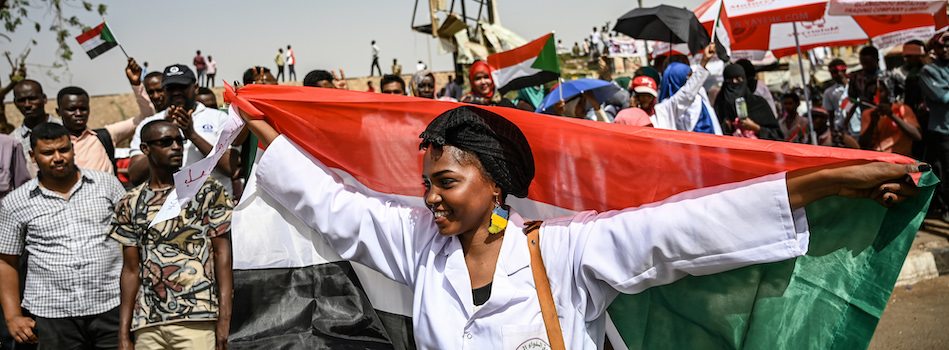As the world marks International Women’s Day, TIMEP speaks to women advocates across the Middle East and North Africa (MENA) region on the ways in which they are challenging the roots of gender inequality.
In this Q&A on the challenges and issues facing women in Sudan, and the way forward amid the country’s critical transition, TIMEP interviews Sudanese feminist Malaz Emad.
TIMEP: Women were at the forefront of Sudan’s 2018-2019 revolution, leading protests and articulating powerful demands for change. How would you describe the role currently being played by women in Sudan’s ongoing resistance movement since the coup?
ME: Sudanese women have not wavered in standing firmly against the coup and those events that have negatively affected Sudan. They know all too well the impact that the coup has had, and will have, on the status of women and the issues women face, including violence and the deterioration in the economic, social, and political situation. The participation of women in the popular movement was and still is strong and is taking place via the diverse avenues available to them. Some participate by being on the frontlines of demonstrations, others engage through the media, and others provide field and medical assistance to injured protesters. Women have also organized by joining resistance activities that reject the coup—such as the resistance committees.
TIMEP: How do the demands of the Sudanese resistance movement intersect with issues of gender justice?
ME: The demands of the Sudanese resistance movement are built on three priorities: freedom, peace, and justice. When we say justice, we mean justice in all of its forms, including social justice and compensation for all victims. Justice in this sense is not separated from gender equality. Gender equality is at the heart of the demands of women’s rights and feminist groups; they consider achieving equality in all areas of one’s life as a goal of the revolution and an impetus for their participation in the protests that have taken place since December 2018. For me, there is no justice without gender justice, and no revolution without a movement that includes these demands in all of their forms. Justice must involve bringing the oppression of the state to an end and amending laws that further gender inequality, labor laws, and other legal frameworks.
TIMEP: In Sudan today, what would you describe as the most significant issues standing in the way of women’s equality and access to equal rights?
ME: The Sudanese Personal Status Law is among the most significant issues impeding equality. As long as this law remains on the books with its current provisions, we will see no real change in gender issues. This law is a product of the approach of the old regime with its political Islamist views that do not accommodate or reflect the diversity that exists in Sudan today. Sudan is a country of different races, religions, and cultures, and there must be laws that reflect this diversity and that bring about justice for all segments of society. Another significant issue impeding equality between men and women in Sudan are prevailing social norms, most notably around political participation, women’s right to work, and economic independence.
TIMEP: What role has civil society and feminist movements on the ground played in bringing about greater access to equal rights in Sudan?
ME: In my opinion, civil society organizations dedicated to addressing gender equality in Sudan have faced a number of challenges, including not having sufficient and safe spaces to conduct their work amid a challenging political context, and the lack of a clear strategy to work on the civil and societal levels. Despite this, there are several Sudanese feminist organizations and movements that have taken on these issues, submitted proposals to amend problematic legislation, opened the space for discussion on these issues by organizing seminars and forums, and worked to establish clearly articulated and written demands directed at the civilian government to bring about and support change. As the political situation evolved, advocacy campaigns have also been organized. One prominent campaign, “Khoshee Ellagna” (“Enter the Committee”), aimed to support women’s participation in the political and public spheres, advance their demands, and increase their presence in decision-making positions.
TIMEP: In your view, what are the most important legal and political reforms that should be made to promote women’s equality in Sudan?
ME: The most important and prominent legal reforms that we currently need in Sudan are amendments to the Personal Status Law, changes to a number of provisions in the country’s labor laws, and the implementation of agreements like the Convention on the Elimination of all Forms of Discrimination Against Women (CEDAW), which has not been applied on the ground even though the government had signed it. These changes must take place with the participation of feminist movements and civil society organizations to ensure that the steps that are taken actually address root causes and bring about systemic change in the unfair frameworks that are governing them simply because they are women.
And of course, these amendments cannot be separated from political change. I believe that all feminist and women’s rights organizations should unite under the umbrella of shared goals that bring about women’s political participation and their presence in decision-making roles in key institutions, all of which should be commensurate with the immense sacrifices that Sudanese women have made for change and the fight for freedom, peace, and justice.
This interview is part of TIMEP’s Forging a Gender Equal World: Women in MENA Q&A series, a collection of interviews with women from and in the MENA region on their work combating gender inequality.
